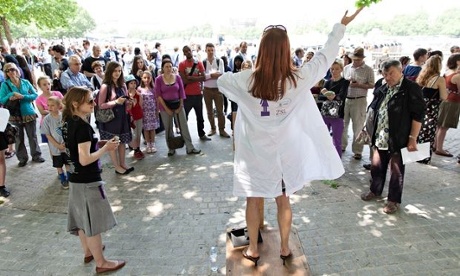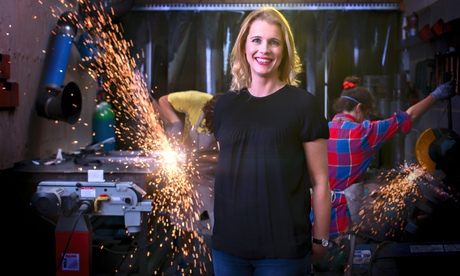On Sunday, London’s South Bank will be flooded with scientists: quantum physicists, large carnivore experts, cancer researchers, climate scientists … They will all be wearing the stereotypical scientist’s lab coat, but only so you can spot them in the crowds – because these scientists won’t look like your "typical" scientist. They won’t have shaggy grey beards, sock-clad sandalled feet or Einstein-esque hair. In fact, they will be so normal-looking you’d probably swear you’d seen them the other day in the park, at the cinema, or perhaps on the school run.
They won't be some new breed of scientist. They will just be women.
Soapbox Science takes some of Britain’s top female scientists and puts them on upturned crates on busy urban streets to share their passion with the public. Yes, it’s positive discrimination. Yes, it’s controversial/not politically correct/unfair on men. Both men and women feel uncomfortable with the idea of positive discrimination: who would want to be credited for their gender rather than their scientific excellence?
We agree. But we also think there is a time and a place when positive discrimination is justified, and Soapbox Science events make this statement, on behalf of women in science, in the UK and beyond.
Behind the safety of a pint (or two), male colleagues tell us that women-only initiatives make them feel guilty for being men, and that they are not sure how they can (or should) contribute. Female professors wonder why any woman who is good at her job would need positive discrimination; after all, haven't they managed to succeed without it? Less senior women in science recoil from all-women events: they worry about tokenism, how their (male) colleagues would perceive them, they fear being pro-gender over pro-excellence. Quite rightly, these scientists want to succeed because they are fantastic and innovative, not because they are female.
Scientists who put themselves at the front of the science festival exhibit or get that golden minute on Radio 4’s Today programme benefit from the increased visibility, influence and networking opportunities, additional funding opportunities, increased interest from students for potential recruitment, as well as enjoyment and personal reward. However, spotting a female scientist in the media or as the public face of a successful science exhibition or scientific breakthrough can be tricky. Female scientists are less likely to be in the media; less likely to be listed as either first or last author on a scientific paper; less likely to be invited to review and comment on papers published by prestigious journals; and less likely to speak at scientific conferences.
There is most certainly some unconscious bias here, and of course one could argue there are fewer women to choose from. Sadly, though, men are perceived as being more capable in science, technology, engineering and maths (STEM) subjects than their female counterparts, irrespective of real talent and achievements.
The upshot of all this is that the public rarely glimpse successful women scientists. This has knock-on effects for the next generation, both in the visibility of role models for young girls but also in influencing young parents: even if a seven-year-old girl is not listening to the Today programme or The Life Scientific, her parents might be. And these are the people who influence a child’s career choices, consciously or not.
When it is as natural to think of a scientist being a woman as a man, then perhaps we can finally say goodbye to unconscious bias.
This is why Soapbox Science shamelessly exercises positive discrimination. It allows the UK’s female scientists to step into the limelight for an hour to share their science in an environment where they don’t need to compete with scientists who are not being discriminated against because of their gender (unconsciously or not), who might have fewer domestic demands on their time, and who didn’t grow up with preconceived ideas about the great things they could (or could not) achieve.
Soapbox also provides the public with much needed role models of successful women in science at all stages of their careers, and from all walks of life. We are the only public engagement event in the UK that explicitly promotes women as well as science.
But Soapbox is not alone in its "positive discrimination" policy. Athena SWAN is a pro-equality initiative that is shaming university science faculties across the UK into a flurry of sex ratio calculations. Most departments are horrified to see their healthy 50:50 sex ratios among early career researchers plummet to a shocking 17% women at the professorial level. And more generally, only about 1 in 10 STEM jobs are held by women. It’s true that there is a higher proportion of women studying STEM subjects at university now than there was 20 years ago, but that doesn’t mean we should let the "sink-or-swim" attitude continue to prevail.
Once it becomes acceptable in society and the workplace for men to take an equal role in family life (and not be afraid to talk about it), then we won’t need the positive discrimination that Soapbox Science and Athena SWAN currently practice. Perhaps in 5 or 10 years' time we’ll be parading scientists who value a work-life balance, irrespective of gender. But for now, we need to focus on the immediate problem: female scientists need to feel valued as scientists conducting world-class science, both by their peers and the public.
Nathalie Pettorelli is at the Institute of Zoology, Zoological Society of London, Seirian Sumner is at the School of Biological Sciences, University of Bristol. They founded Soapbox Science four years ago to promote the visibility of women in science in a simple, yet very public way. You can meet them, along with 12 other female scientists on London’s South Bank at Gabriel’s Wharf on Sunday 29 June, 12-3pm. More information here.










